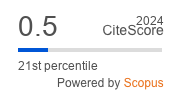The methodological basis for knowledge management system: an analytical review
Abstract
The article presents the methodological basis for knowledge management as a relatively independent type of special management which aims at the creation, transfer, distribution, storage, use and development of knowledge, as well as the formation and use of the intellectual capital of a scientific (medical) organization. The authors show that in the present conditions in the integration of knowledge management the quality management system becomes a major factor of competitiveness of organizations. The decisive role in the management of knowledge belongs to supporting the development of information systems using a single technology and standardized measurement procedures and formalization of knowledge which influence on the improvement of the effectiveness of the organization.
About the Authors
A. I. VyalkovRussian Federation
MD, academician of RAMS, prof., director of the Research Institute of public health and health management
I. B. Gorbunova
Russian Federation
PhD, assistant prof. of the chair of health and drug management, head of the Department of quality management
E. A. Glukhova
Russian Federation
PhD, senior researcher of the Laboratory of coordination of inter-institutional research on public health and health management of the Research Institute of public health and health management
S. A. Martynchik
Russian Federation
MD, head of the Laboratory of problems of labor effi ciency in health care
References
1. Бонтис Н. Оценка знаниевых активов: обзор моделей, используемых для измерения интеллектуального капитала / Управление знаниями: Хрестоматия. — СПб: Изд-во «Высшая школа менеджмента», 2010. — С. 312–347.
2. Венгер Э., Шнайдер У. Сообщества практиков: новый горизонт развития организаций / Управление знаниями: Хрестоматия. — СПб: Изд-во «Высшая школа менеджмента», 2010. — С. 379–392.
3. Гапоненко А.Л., Орлова Т.М. Управление знаниями. Как превратить знания в капитал. — М.: Эксмо, 2008. — С. 177–208.
4. Гаравелли К., Горгаглионе М., Скоззи Б. Стратегия управления знаниями и организация: подход к анализу / Управление знаниями: Хрестоматия. — СПб: Издво «Высшая школа менеджмента», 2010. — С. 205–225.
5. Делонг Д.У., Дейвенпорт Т. Эффективные методы сохранения знаний в организациях: передовой опыт / Управление знаниями: Хрестоматия. — СПб: Изд-во «Высшая школа менеджмента», 2010. — С. 293–312.
6. Делонг Д., Фейхи Л. Диагностика культурных барьеров в управлении знаниями / Управление знаниями: Хрестоматия. — СПб: Изд-во «Высшая школа менеджмента», 2010. — С. 243–275.
7. Кузнецов С.В. Технологии управления, основанного на знаниях // Проблемы теории и практики управления. — 2004. — № 6. — C. 85–89.
8. Мильнер Б.З. Управление знаниями: принципы, методы, эффективность // http://www.koism.rags.ru/publ/articles/26.php (дата обращения — 17.03.2012).






































